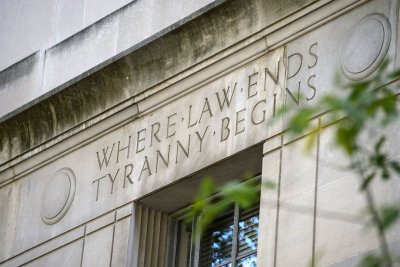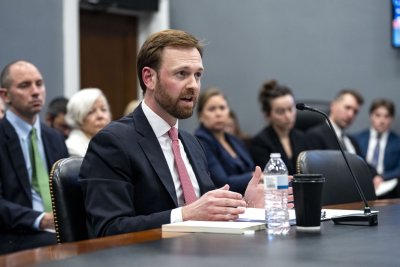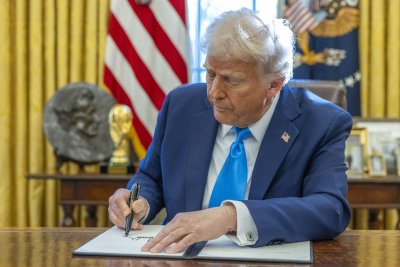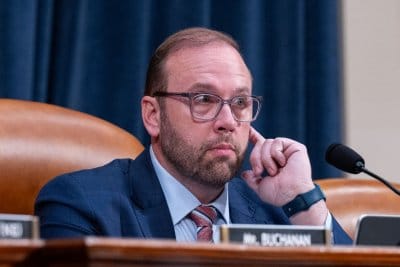May 14 (UPI) — Health and Human Services Secretary Robert Kennedy Jr. defended proposed 2026 budget reductions during separate House and Senate committee budget hearings on Wednesday.
Kennedy started the morning by fielding questions from members of the House Appropriations Subcommittee on Labor, Health and Human Services, Education and Related Agencies.
Chairman Rep. Robert Aderholt, R-Ala., opened the hearing by acknowledging President Donald Trump‘s efforts to enforce the border and its effect on community health and safety.
“The president’s success in securing our border directly benefits public health by reducing the incoming flow of illicit drugs, like fentanyl, which has fallen by 54% since this time last year,” Aderholt said. “That’s no small thing.”
He also commended the Trump administration for reducing the number of unaccompanied minors crossing the border and said he wants to hear Kennedy’s ideas for reforming the Department of Health and Human Services and its sub-agencies.
‘Disastrous’ program funding reductions
Ranking Member Rep. Rose DeLauro, D-Conn., was less conciliatory and referred to the Trump administration’s budget request for the Department of Health and Human Services as “disastrous.”
DeLauro said the proposed budget would reduce funding for health programs by $33 billion.
The proposed HHS budget for the 2026 fiscal year is $93.8 billion, which is a 26.2% reduction from the current budget and includes funding reductions across most programs.
“I view it as a disgrace,” DeLauro said. “Under your budget proposal, Americans would die needless and preventable deaths.”
DeLauro cited funding cuts to the Centers for Disease Control and Prevention and accused Kennedy and the Department of Government Efficiency Director Elon Musk of “eliminating entire divisions without consideration for what is being lost.”
The cuts “affect families and communities” and “are dangerous,” DeLauro said.
Kennedy said his goal is to make America healthy again by focusing on the “chronic disease epidemic.”
HHS also seeks to deliver more effective and efficient services for Americans who rely on Medicaid, Medicare and other programs while reducing costs for taxpayers, Kennedy said.
During the Senate Health, Education, Labor and Pensions Committee budget hearing Wednesday afternoon, Kennedy said states and localities can do a better job of responding to disasters at the state and local levels than the federal government.
He cited Florida’s success in handling hurricanes Helene and Milton last year, with no lives lost there, as an example and said the federal government should focus on national disasters.
Drug prices and healthcare as a human right
Sen. Bernie Sanders, D-Vt., asked Kennedy if he is willing to work to make drug prices in the United States the lowest in the world, to which Kennedy said he is.
Sanders then asked Kennedy if healthcare is a “human right.”
Kennedy said healthcare is not part of the rights enumerated in the Constitution and called it more of a philosophical matter.
Sanders responded by saying “every other country guarantees healthcare” as a right and said Americans don’t want the choice to be uninsured or not have the ability to see a doctor.
Kennedy said “Obamacare” is not working and he and President Trump want to enable everyone to be insured and have access to quality healthcare.
Sanders then cited proposed cuts to programs that serve middle-class and poor Americans and claimed they would end healthcare coverage for 13 million Americans.
Kennedy said the cuts only are for waste and denied they would affect coverage for Americans.
Sen. Rand Paul, R-Ky., followed Sanders and cited examples of wasteful programs that the proposed budget would eliminate.
They include a recent study on the effects of cocaine on lab rats and another study that showed about half of biological males who medically transition to female believe they can get pregnant, the senator said.
Gain-of-function research and COVID-19
Paul also said bipartisan support exists for better controlling gain-of-function research on Ebola, avian flu and other infectious diseases and the potential dangers they pose to Americans.
The senator cited a research study that would put Ebola in an aerosol as a potential biological weapon, which he said could be potentially very dangerous to the general public.
Paul asked Kennedy if HHS would be transparent in gain-of-function research regulations and protect Americans from potentially deadly outbreaks.
Kennedy said HHS would be “absolutely transparent” in regulating gain-of-function research and “bring the public in on the debate.”
He also said National Institutes of Health research “almost certainly” caused the COVID-19 pandemic through gain-of-function research.
Lack of access to critical care
Sen. Patty Murray, D-Wash., said she opposes staffing reductions at the NIH and cited a constituent with stage-four cancer who recently was told her treatment would be delayed by four weeks due to staffing shortages.
Kennedy offered to intervene on that person’s behalf and ensure she receives needed care right away.
Sen. Tammy Baldwin, D-Wis., accused Kennedy of “hiding information” from the American people and asked if he believes lead poisoning is a problem.
Kennedy said he thinks it’s a very serious problem, but Baldwin said “the entire lead-poisoning program staff has been fired.”
She asked if Kennedy intends to eliminate the program that helps communities address lead poisoning, which he said will not happen.
She also said HHS has provided about $1 billion less in Head Start program funding and asked why there are funding delays.
“There should not be any delays,” Kennedy said. “The funding is there.”
He suggested staffers who want to make the Trump administration look bad are slowing down disbursements for Head Start and similar programs.
The House and Senate hearings were held before a vote on a proposed 2026 federal government budget measure that Trump has referred to as “one big, beautiful bill.”
Protesters arrested for disrupting hearing
While the Senate hearing was underway, Ben & Jerry’s co-owner and co-founder Ben Cohen and six others were arrested for disrupting the hearing, Axios reported.
Cohen and the others were protesting the United States’ support of Israel in its war with Hamas in Gaza.
The protesters yelled, “RFK kills people with hate!” before Capitol Police escorted them from the room.
They were arrested and charged with crowding, obstructing proceedings or incommoding.
Some protesters also were charged with assaulting a police officer or resisting arrest, but Cohen was not among those so charged.







































